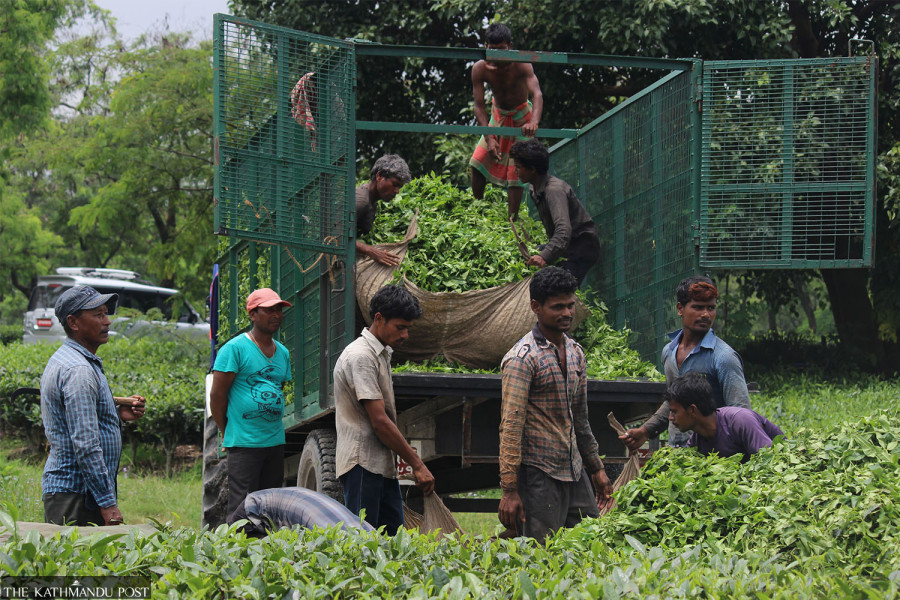Money
India stops tea-laden Nepali trucks on border for lab tests
Nepali traders suspect geopolitics after the Indian government recently ordered its customs to sample every single batch of Nepali tea destined for India.
Parbat Portel
As India has asked its customs authorities to test the quality of India-bound Nepali tea, trucks laden with tonnes of tea destined for the southern neighbour are currently stuck at the Panitanki Customs across the Nepal-India border.
Nepali traders say India’s Commerce Ministry recently issued a circular to its customs offices to test the quality of all tea imports from Nepal.
In 2005 and 2015, the Commerce Ministry of India had issued a similar circular to its customs to conduct mandatory lab tests on Nepali tea.
“Since then, Indian customs had been randomly sampling 5-20 percent of Nepali tea,” said Eshwor Raj Poudel, consul general of Nepal to Kolkata, India. “But this time the Indian government ordered sampling every single batch, or 100 percent, of tea before exporting to India. The new circular has created problems,” he said.
Citing the circular, Poudel said, the southern neighbour has directed its customs to allow Nepali tea only after a negative report for toxins.
A few weeks ago, a lab test report of tea exported from Ilam to India came with a positive result for toxins, which has caused a problem in the export of Nepali tea to India, Poudel said.
“If the lab report of the new sample comes positive, it will give an easy excuse for India to stop the import of Nepali tea,” Poudel said.
Nepali tea samples are tested at the National Food Laboratory, Kolkata, India.
It takes 15 days for the results, which is likely to increase the cost of Nepali tea.
“We are compelled to park the tea-laden trucks on the road until the report comes. The tea can get damaged if it is held for a longer time,” said Roshan Agrawal, a customs agent. “There are no well-managed customs on the Indian side due to which we are forced to wait for the report by parking the trucks on the road.”
Poudel said that he has informed the Nepali Embassy in New Delhi and the Foreign, Agriculture and Industry and Commerce ministries about the issue. He said he also informed the Indian Embassy in Nepal about the problem.
“We have asked the Indian authorities to stick with the existing circular and not to enforce the new one,” Poudel said. “As the issue is related to public health, we don’t know how India will take our request,” he said.
Around 92 percent of Nepal-produced tea is exported to India through the eastern border point while 6 percent is exported from Biratnagar and 2 percent from Birgunj.
Some traders suspect geopolitics may be behind the new “hassles”. Recently, there have been reports that Nepal has been exploring alternative markets like China and Pakistan—two arch rivals of India—to export its tea.
Officials from Pakistan and China have been visiting Nepal to study tea and to potentially look for long-term supply agreements, according to the sources privy to the matter.
Nepal’s tea exports declined by 11.82 percent in the first eight months of the current fiscal year compared to the same period last fiscal year, customs data show.
Nepal exported 9,823 tonnes of tea—both orthodox and CTC—worth Rs2.46 billion during the review period.
Demand for Nepali tea has been rising as the bushes in Darjeeling have aged. Therefore, the Nepali tea leaves were a valuable input for the factories in and around Darjeeling, traders said.
For years, Indian buyers have been alleging that Nepal’s tea is substandard and, as a result, offering lower prices. Nepali tea is often stopped at different border points under various pretexts.
In June 2022, India’s Parliamentary Standing Committee on Commerce asked the Indian government to apply stringent requirements for the certificate of origin on tea imported from Nepal.
The committee had said the entry of low-quality products from neighboring countries was jeopardising the Indian tea industry and called for the imposition of anti-dumping duty ranging from 40-100 percent. The panel had also called for a review of the Indo-Nepal Treaty of 1950.
In 2018, 11 trucks carrying tea were stopped at the Indian customs at Panitanki for a week over quarantine issues. Again, in 2020, over a dozen trucks carrying Nepali tea were stranded on the bridge over the Mechi river for days.
The Darjeeling Tea Association, for a long time, had been requesting the Indian government to stop tea imports from Nepal.
The National Tea and Coffee Board has prepared draft guidelines, which are in the final stages of completion to give the CTC tea a quality trademark recognition. In September 2020, Nepal’s orthodox tea got its trademark, 157 years after the country started growing the herb.
The market for Nepali CTC tea is also gradually being expanded to other countries.




 8.54°C Kathmandu
8.54°C Kathmandu














